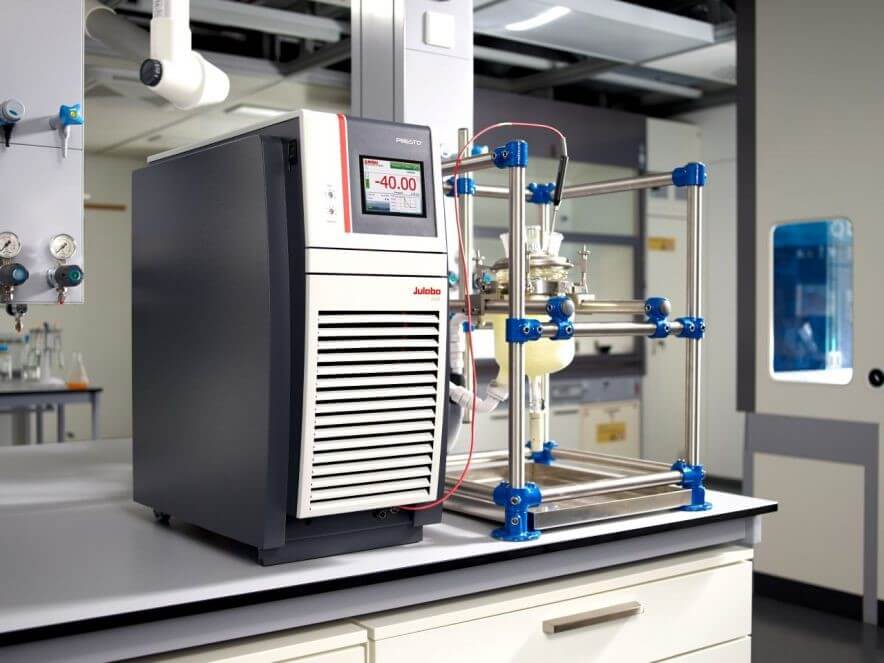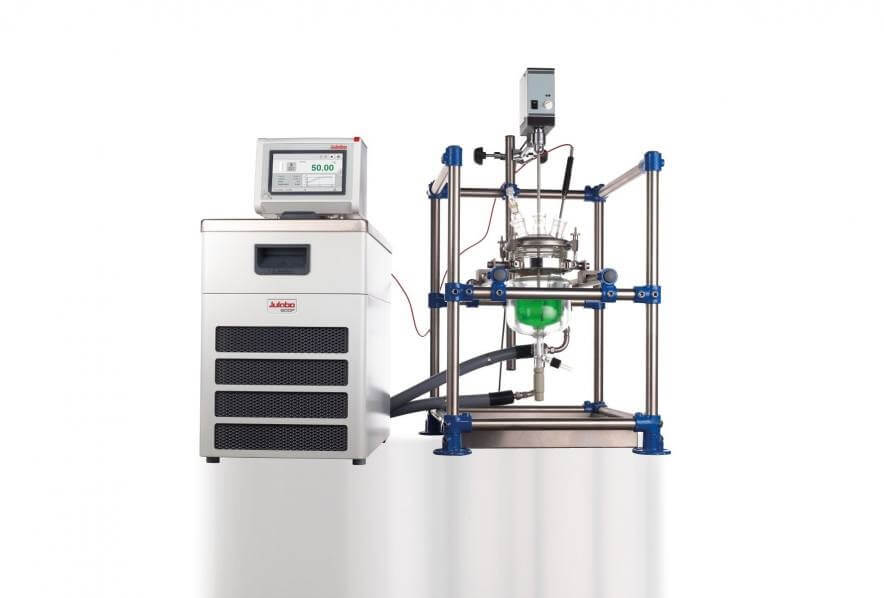
Temperature Control in the Chemical Industry
The chemical industry relies on efficient and safe processes to meet its production requirements. Most chemical reactions are either exothermic and release heat, or endothermic and absorb heat, therefore reliable temperature control systems play an essential role in the chemical industry. Accurate and reliable temperature control of individual process steps is of decisive importance, especially in process engineering. The use of compact recirculating coolers in process engineering ranges from laboratory benchmark in the development of new materials and processes to the temperature control of large industrial plants.
Applications and Processes in Process Engineering
Process engineering is an interdisciplinary engineering science. This process deals with the “technical and economic execution of all processes in which substances are modified according to type, property, and composition.” Process engineering uses chemical, biological, or physical processes to initiate material changes. These changes then form an interface between the natural sciences and production.
The optimisation of process steps in established methods also fall within the scope of process engineering. Recycling and the recovery of valuable resources is increasingly vital within process engineering also.
Temperature Control in Process Engineering

When it comes to the chemical industry and specifically in process engineering, numerous process sequences are bound to one temperature or are supported by a specific temperature control application to be made more efficient. An example of this is the continuous temperature control of casting media. To maintain the necessary viscosity, the material pipes, pumps, and dosing unit can be heated in addition to the storage tank. Optimum temperature control from 20 to +40ºC of the casting material throughout the entire process not only makes it easier and faster to process - but it also simplifies the ascent and exit of air inclusions. This reduces production times and rejects, as well as improves quality. The temperature control systems used must be able to react continuously and quickly to changes and stabilize the process. Ideally, their performance is directly coupled to the viscosity of the casting medium, for example, and automatically adjusted to the optimum range using adaptive temperature changes.
However, the dynamic compensation of exothermic or endothermic chemical reactions poses far greater challenges to the temperature control systems. If the reactions take place in extreme temperature ranges, the temperature control systems must provide for fast compensation. This not only ensures an efficient and consistent result but also makes sure the process is safe.
Reactor Temperature Control

In both chemical and biological processes, the conversion of substances often takes place in reactors. This makes it possible to create consistent conditions and a safe space for the reactions. This requires temperature control systems with fast and precise compensation along with a wide temperature range. Therefore, refrigerated circulator baths are used, which react highly dynamically to temperature changes inside the reactor, compensate these quickly and reliably, and automatically adjust back to the optimum range. The reactor type, its size and the material (e.g., glass or metal) as well as the wall thickness, and the thermal conductivity associated with the material are, among other things, decisive parameters which, in addition to the process to be temperature-controlled, themselves influence the choice of the temperature control system. Pump capacity, pressure build-up, heat exchange rates, and the efficiency of the components in the temperature control system have to accurately cover the respective requirements to guarantee process reliability and effective material conversion. If requirements deviate from the standard, specially developed temperature control solutions are also taken into consideration. This is not necessary very often as temperature control systems available on the market today can be easily and efficiently adapted to individual requirements.
From Laboratory Benchmark to Large-scale Plant
Temperature control system requirements also depend on their range of application. When it comes to developing new procedures in the laboratory, wide working temperature range, as well as simple and flexible change between applications, are of decisive importance when it comes to the selection of the temperature control system. The compact recirculating coolers can, therefore, be used in a wide variety of applications without any problems. Aspects such as the size and mobility of the device, water, or air cooling as well as a sophisticated positioning of connections and vents make the decisive difference as to how suitable the temperature control systems are for everyday practical use. In large-scale industrial applications, consistent performance with low maintenance requirements and high energy efficiency are the main priorities. Since the units are usually only used for temperature control of a single process, a lower dynamic range may be sufficient.
Conclusion
Precise temperature control systems are the decisive influence on production output, product quality, and process reliability in both chemical reaction and process engineering. Here at Lab Unlimited, we can provide temperature control systems that can individually adapt to most applications due to the extensive range of accessories available, the wide temperature range, and the extraordinary dynamics. Nevertheless, the development of an individual solution specially adapted to your application is possible at any time.
We have experts in the temperature control area that would be pleased to advise you and develop a temperature control solution with you that is perfectly designed for your application in all parameters. Contact the experts today with any questions you have!
|
To find out more: |
